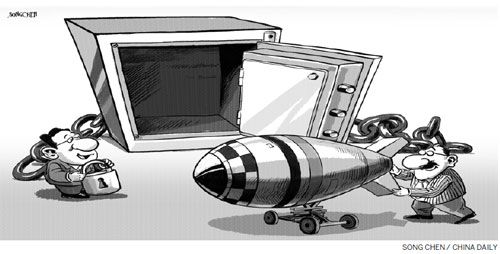P5 should help make NPT a success
Updated: 2014-04-22 08:40
(China Daily)
|
|||||||||

Editor's Note:
A conference of the so-called P5 countries, the United States, the United Kingdom, Russia, France and China, was held in Beijing on April 14 and 15 with a view to enhancing strategic confidence and working together to implement the Nuclear Non-Proliferation Review Outcomes and continue discussions on issues related to the three pillars of the Nuclear Non-Proliferation Treaty, namely disarmament, nonproliferation, and the peaceful uses of nuclear energy. The China Arms Control and Disarmament Association also held a public symposium on the "Comprehensive Enhancement of the NPT Three Pillars" on April 15, and below are excerpts of some of the views expressed:
Build consensus on conceptual guidance
The NPT treaty has been confronted with daunting challenges in recent years, such as how to reactivate the process of nuclear disarmament among nuclear weapon states, and how to persuade those few countries still remaining outside the non-proliferation regime to join it or return to it.
From the Chinese perspective, however, we should perhaps first build up consensus on the conceptual guidance for nonproliferation efforts.
First, a shared vision about the role of nuclear weapons, which should have no place in any national security strategy, is necessary. To begin with, all nuclear weapon states can refer to China's no-first-use policy, which would be a significant measure in building confidence and strengthening mutual trust among nuclear weapon states, containing nuclear competition, and paving the way for the progress of nuclear disarmament.
Second, the international community needs a correct strategy for non-proliferation, which should address both the symptom and root cause of the proliferation of weapons of mass destruction. This means developing a peaceful and stable international environment, creating a fair and just international political and economic order, and opposing hegemony and power politics, so that countries have adequate sense of security, instead of feeling the need to employ nuclear weapons for their security.
Last but no less important, more concentration should be put on international cooperation to propel non-proliferation, which cannot rely on the single-handed efforts of one major power or a power group, and major powers should respect the sovereignty and legitimate security concerns of others.
Pan Zhenqiang, retired major general and senior adviser to the China Reform Forum.
Strengthen dialogue between P5 countries and non-nuclear states
It is time to think seriously about how to strengthen dialogue and collaboration between the P5 and the NPT non-nuclear weapon states. The P5 need the support of the non-nuclear-weapon states to achieve their non-proliferation, nuclear security, and nuclear disarmament objectives, and this is one of the most important steps that can be taken to enhance the effectiveness, universality, and authority of the NPT.
Within the NPT specifically, the very divergent assessments of how successfully the nuclear disarmament goal is being pursued threatens to erode the NPT as a legal, normative, and institutional barrier to more widespread proliferation
Today's interaction between the P5 and the non-nuclear-weapon states, which is characterized by set-piece exchanges in the NPT Review process, as well as by the refusal of P5 countries to participate in the UN Open-Ended Working Group on Nuclear Disarmament, makes it harder to build shared responsibility among the NPT Parties to achieve all of the Treaty's goals.
There are different ways that a collaborative dialogue could be created and institutionalized, for example, adding at next year's P5 Conference a half-day roundtable among the P5 and NPT non-nuclear-weapon states on nuclear disarmament building blocks or by creating a P5-non-nuclear weapon states "Group of Technical Experts on Nuclear Disarmament." Although the process might be long, it must begin now.
Lewis A. Dunn, Principal, Science Applications International Corporation, US. The views are personal own.

 Music at her fingers
Music at her fingers
 Across America Over the Week (Jan 16 - Jan 22)
Across America Over the Week (Jan 16 - Jan 22)
 Spend Chinese New Year in style
Spend Chinese New Year in style
 Ili river valley becomes a popular destination for swans
Ili river valley becomes a popular destination for swans
 Philip Ma: from scientist to businessman
Philip Ma: from scientist to businessman
 Birmingham's Spotlight on China dinner
Birmingham's Spotlight on China dinner
 How to distinguish doucai, wucai, Famille-rose and enamel porcelain
How to distinguish doucai, wucai, Famille-rose and enamel porcelain
 Xinjiang lake in bumper fishing season
Xinjiang lake in bumper fishing season
Most Viewed
Editor's Picks

|

|

|

|

|

|
Today's Top News
Houston's SW Chinatown
China to focus on reforms, opening of capital market
Slowdown brings new risks to banks
Trade group calls for BIT
Market status for China is 'political' issue
Birmingham's Spotlight on China dinner
Bank takes renminbi-clearing seriously
Traditional Garb
US Weekly

|

|








